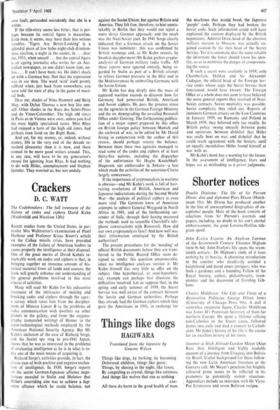Tigers Are Better-Looking, with a selection from The Left Bank
Jean Rhys (Deutsch 25s)
Bitter-sweet
RAYNER HEPPENSTALL
A thing I notice annually is that when, come Christmas, regular reviewers and stray celebri- ties tell us in the quality Sundays what their books of the year were, these are always books that were published in the autumn. Similarly, when persons now in early middle age or younger consider the 1930s, what they say applies only to the last few years of the decade, which in any case were not so dominated by leftish Oxford poets.
In those days, too, one heard of unjustly neglected writers, notably women. One who was frequently urged on me was Mary Butts.
I did not hear of Jean Rhys. I read Mary Butts and liked what I read, though I felt that too much had been claimed for her. My reaction to Jean Rhys has been much the same, at least in respect of her earlier writings.
The pleasing thing about her rediscovery is that it rekindled her energies, so that she fin- ished The Wide Sargasso Sea. Those energies were not, it is true, quite dormant. Half of the stories in the present volume were written after the outbreak of Churchill's war. But, just as I find The Wide Sargasso Sea more interesting than Miss Rhys's earlier novels, so, in the pre- sent volume, the story I most admired was 'Let Them Call It Jazz,' apparently the last writ- ten. A virtue shared by that novel and this story is that, although both draw on memories of a West Indies childhood (and the story also on memories of dismal lodgings round Notting Hill), neither is at all directly autobiographical. Both required a detachment and an imaginative effort not always evident elsewhere.
The sketches from The Left Bank, first pub- lished in 1927, do not pretend to be anything more than that, were indeed originally sub- titled 'sketches and studies of present-day Bo- hemian Paris.' La Grosse Fifi' and 'Vienne' are,
no doubt, properly stories, but much of the rest is the merest reportage, though I don't suppose it was called that then. It is less than brilliant. Pace her most dedicated admirers, I don't think that sharpness either of eye or of ear were
ever Miss Rhys's most conspicuous gifts. In 'Vienne' we seem already to be with that com- posite heroine who, under a variety of names.
moves unhappily through the earlier novels, ditched by some man, bitched by other women, lost, drinking, broke, sometimes ill, sleeping on veronal and lumina!, holding back tears or failing to hold them back.
This same figure reappears in the later stories, is called Petronella, Inez, Teresa, can hardly be Lotus quite, can hardly be Maidie, has no name, remembers Dominica, is commonly in England but once at a clinic in Versailles. 'The Lotus
and the title-story are livelier, more extroverted, even rumbustious. And yet the former, set off Portobello Road, is essentially glum, with its treacherous male, its bright bitch-woman, the sick, drinking heroine, now grotesque, never so sneered at, so told that her misfortunes are her own fault, .persuaded mistakenly that she is a writer.
If the title-story seems less bitter, that is per- haps because its central figure is masculine. Even men, it seems, may have their less serious troubles. 'Tigers Are Better-Looking' is a splendid piece of low Soho night-club drunken- ness, ejection, a night in the cooler, in . . . dear me, 1935, when oneself ... but the central figure is an ageing journalist who writes for an Aus- tralian newspaper, so one didn't know him, un- less . . . It can't have been, no. He didn't shack up with a German boy. Not that the expression was in use then. The word `with' itself primly sufficed when, just back from somewhere, you were told the state of play in the game of musi- cal beds.
Dear me, shades of Nina Hamnett and Betty May, with Dylan Thomas a new boy like one- self. Other shades in the Rues des Saints-Peres and du Vieux-Colombier. The high old times in Paris as in Vienna were over, unless you had the most highly specialised tastes. Miss Rhys had enjoyed a taste of the high old times, had perhaps even lived on the Right Bank.
And yet, for my money, or, indeed, without money, life to the very end of the decade re- mained pleasanter than it is now, and there seemed to be more good writers around. This, at any rate, will have to be my generation's excuse for ignoring Jean Rhys. It had nothing, to do with Hitler, unemployment and Stephen Spender. They worried us, but not unduly.















































 Previous page
Previous page